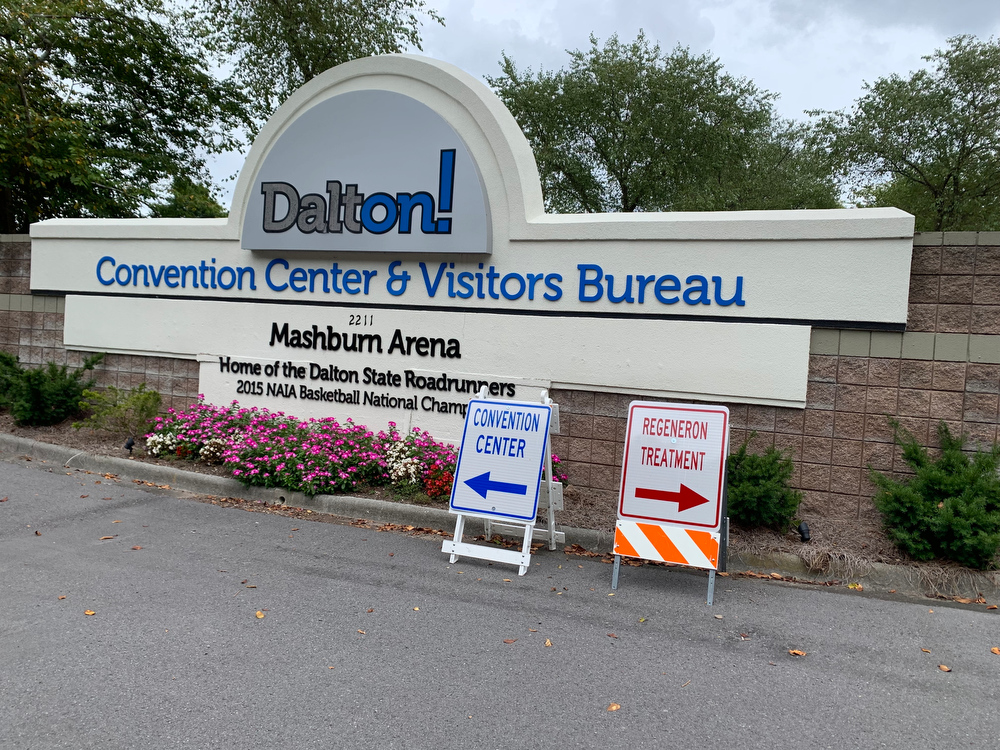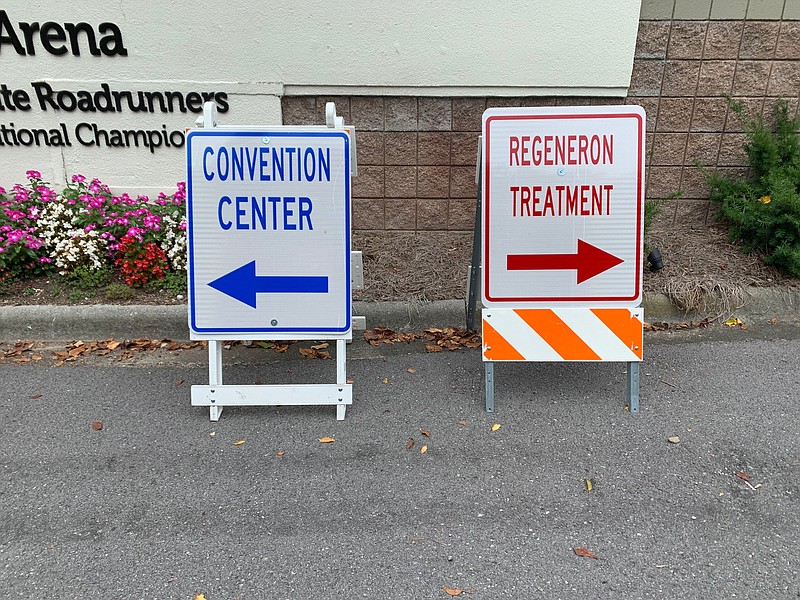The city of Dalton's Regeneron treatment clinic took its first official appointments Friday, just two days after the city announced it would be the first in the state to offer free monoclonal antibody treatment to people in the early stages of COVID-19 infection.
All appointment slots for Friday were filled within the first hour of treatments being made available on the city's website, spokesperson Bruce Frazier said Monday. Sixty people were treated the first day, and appointments have been full since with 60-80 people being seen every day, he said. For those arriving to receive treatment, the therapy they are getting - REGEN-COV from the biotechnology company Regeneron - is not intended as a vaccination or preventative measure. It is designed to hopefully boost the recipient's immune system enough to keep them out of the hospital after a positive diagnosis.
The treatment, which the Food and Drug Administration approved under "emergency use" provisions of federal law, has been shown in clinical studies to help reduce hospitalization and death caused by the novel coronavirus by as much as 71%.
According to Dalton City Council member Annalee Harlan, the monoclonal antibodies are given through a series of four back-to-back injections to the abdomen, all given during the same visit. As they start to work, the COVID-19 monoclonal antibodies in the injections mimic the immune system's ability to fight off harmful pathogens such as viruses. Casirivimab and imdevimab are monoclonal antibodies that are "specifically directed" against SARS-COV-2 and designed to "block the virus' attachment and entry into human cells," the FDA said in a November 2020 news release related to Regeneron's emergency-use approval.
The treatment requires a one hour observation period and should be received within seven days of a COVID-19 diagnosis for best results.
According to the FDA, Regeneron treatments are not authorized for patients who have been hospitalized due to COVID-19, who require oxygen therapy due to COVID-19 or who require an increase in baseline oxygen flow rate due to COVID-19 because of underlying non-COVID-19-related illnesses. Once a person has been hospitalized and put on high flow oxygen or mechanical ventilation, the FDA said, monoclonal antibody treatments "may be associated with worse clinical outcomes."
Because of that, Harlan said the sooner a person gets the treatment after testing positive, the better. For the immunosuppressed or those at high risk for severe COVID-19 illness, she suggested getting treated within 48 hours or sooner. Some of the conditions that make someone high risk for severe illness include diabetes, obesity, sickle cell disease, chronic lung disease, chronic kidney disease, hypertension and cardiovascular disease. Pregnancy is also considered a high-risk condition.
(READ MORE: Catoosa County Public Schools moves to new 3-week COVID schedule)
"We want to try to get this available to people hopefully the day or the day after they test positive," Harlan said. "The purpose of this therapy is to mitigate the escalation of illness with COVID-19 and the entire goal from a population health standpoint and management standpoint is to lessen the burden on our hospital system."
After receiving the treatment, those who have not yet been vaccinated will still be able to do so completely safely.
"Think of it like this: Regeneron treatments help people who have COVID right now," Harlan said. "Vaccines fight off future infection. We're very proud to offer this treatment, but it is not a substitute for a vaccine, point blank."
Regeneron treatments in Dalton are completely free for COVID-positive people over the age of 12. Harlan said a partnership with AmericsourceBergen, the therapy's distributor, assured there was "no outside expense for the procurement of the drug" on the part of the city. The cost of labor, syringes and other materials used to administer the treatment will come out of the city of Dalton's general fund, though the exact dollar amount that will be spent is not yet known.
"I don't think those tabulations have been made yet," Frazier said Monday.
Appointment slots are being added every 48 hours to the city of Dalton website at daltonga.gov. The Regeneron treatment clinic will be closed Tuesday due to concerns about the weather. Frazier said he expects the clinic to be up and running again Wednesday as long as the weather continues to hold out.
According to the Georgia Department of Public Health's vaccine distribution dashboard, 36% of Whitfield County residents were fully vaccinated as of Friday. The statewide percentage of fully vaccinated residents is somewhat higher at 43%. The vaccination rate for the nation as a whole is 52.3%.
At Hamilton Medical Center in Dalton, 93% of all patients hospitalized with COVID-19 were unvaccinated as of Monday.
(READ MORE: Dalton, Georgia, to offer COVID-19 antibody treatment at drive-in clinic)
Vaccines are still free statewide for everyone, and identification is not required when getting vaccinated.
For more information on how to get vaccinated in North Georgia, visit nghd.org or nwgapublichealth.org. Contacts for other COVID-19 vaccine providers in the area are available at vaccines.gov.
 Staff Photo by Alison Gerber / The city of Dalton's Regeneron treatment clinic at the Dalton Convention Center took its first official appointments Friday, just two days after the city announced it would be the first in the state to offer free monoclonal antibody treatment to sick people in the early stages of a COVID-19 infection.
Staff Photo by Alison Gerber / The city of Dalton's Regeneron treatment clinic at the Dalton Convention Center took its first official appointments Friday, just two days after the city announced it would be the first in the state to offer free monoclonal antibody treatment to sick people in the early stages of a COVID-19 infection.Contact Kelcey Caulder at kcaulder@timesfreepress.com or 423-757-6327. Follow her on Twitter @kelceycaulder.
